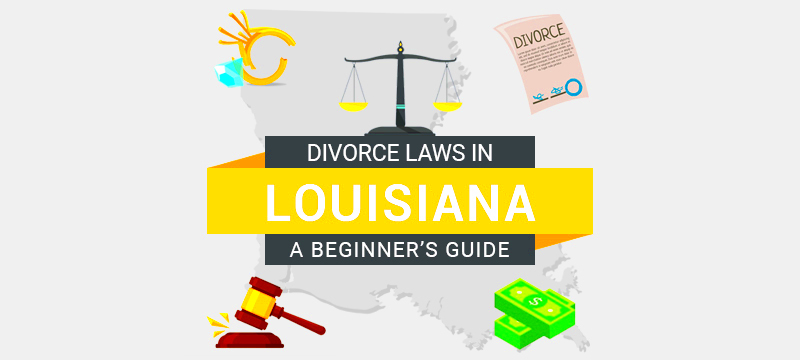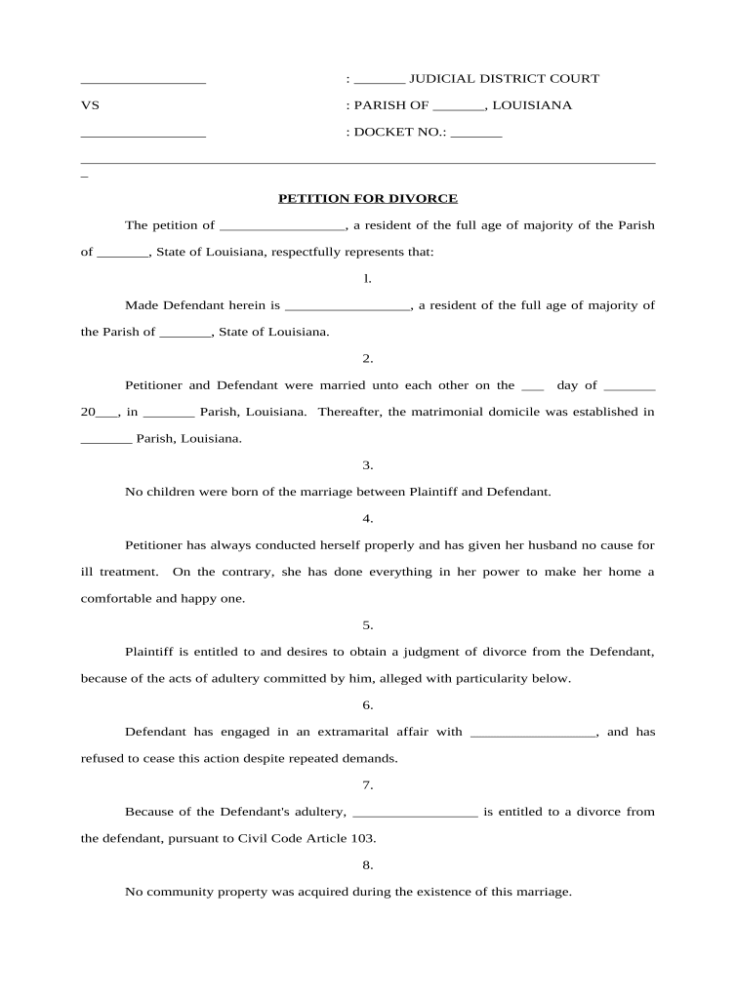Louisiana Divorce Law: Adultery and Legal Impacts
Divorce can be a challenging process, especially in Louisiana, where the laws can be quite complex. Understanding the legal framework can help individuals navigate their rights and responsibilities during this time. Louisiana is unique because it operates under a civil law system rather than a common law system. This means that the laws are codified and can differ significantly from other states. Knowing how Louisiana divorce law works, especially concerning adultery, is crucial for anyone considering a divorce.
What Constitutes Adultery in Louisiana Divorce Cases

In Louisiana, adultery is defined as a spouse’s voluntary sexual intercourse with someone who is not their spouse. This act must occur during the marriage and can be considered a ground for divorce. Here are some key points about adultery:
- Proof Required: To use adultery as a ground for divorce, you must provide evidence, such as witness testimonies or documentation.
- Intent: The act must be intentional, meaning that both parties involved knowingly participated in the affair.
- Time Frame: Adultery must occur after the marriage has taken place; any sexual activity before the marriage does not count.
- Emotional Affairs: While emotional infidelity can be painful, it does not meet the legal definition of adultery in Louisiana.
How Adultery Affects Divorce Proceedings
Adultery can significantly impact divorce proceedings in Louisiana. Here’s how it might affect various aspects:
- Grounds for Divorce: Adultery is a valid ground for a fault-based divorce, allowing the innocent spouse to file for divorce without the typical waiting period.
- Child Custody: Courts consider the best interests of the child. While adultery alone won’t determine custody, it may influence the court’s perception of a parent’s fitness.
- Property Division: Fault in the marriage can lead to a more favorable property division for the innocent spouse, though this is not guaranteed.
- Spousal Support: Adultery may affect the awarding of alimony. If one spouse is found at fault, the other may receive higher support or none at all.
Ultimately, understanding how adultery influences these factors is essential for anyone navigating a divorce in Louisiana. Legal advice can provide clarity tailored to individual situations.
Grounds for Fault-Based Divorce Due to Adultery
In Louisiana, you can file for a fault-based divorce when your spouse’s actions are a direct cause of the marriage breakdown. Adultery is one of the main grounds for this type of divorce. It allows the innocent spouse to end the marriage without going through the usual waiting periods that come with no-fault divorce. Here are the key points about filing a fault-based divorce due to adultery:
- Types of Adultery: Adultery can take many forms, including emotional and physical affairs. However, the law specifically addresses sexual intercourse.
- Filing Process: You will need to file a petition for divorce in the appropriate court, clearly stating adultery as the reason.
- Evidence: To prove adultery, you’ll need solid evidence, such as text messages, photos, or witness testimonies. The burden of proof lies with the spouse filing for divorce.
- Legal Representation: Having an experienced divorce attorney can help navigate the complexities of proving adultery and ensure that your rights are protected.
Understanding these grounds helps you prepare for the legal journey ahead, making it easier to focus on your future.
Impact of Adultery on Child Custody and Support
When a divorce involves children, the court’s primary focus is always the best interests of the child. Adultery can influence child custody and support arrangements, but it’s not always as straightforward as one might think. Here’s how adultery plays a role:
- Best Interests of the Child: Courts prioritize the child’s wellbeing over the parents’ marital issues. Adultery alone doesn’t guarantee a change in custody arrangements.
- Parental Fitness: If adultery leads to a lifestyle that may negatively affect the child, such as drug use or unstable living conditions, it could impact custody decisions.
- Child Support Considerations: While adultery doesn’t directly affect child support calculations, it may influence the court’s view on a parent’s financial stability or willingness to provide for the child.
- Legal Representation: An attorney can advocate for your rights and the best interests of your child in custody negotiations.
Ultimately, every case is unique, and understanding the potential implications of adultery can help in preparing for custody discussions.
Adultery’s Role in Spousal Support and Property Division
Adultery can significantly influence how spousal support and property division are handled in a Louisiana divorce. Understanding these implications is crucial for making informed decisions during this challenging time. Here’s a breakdown:
- Spousal Support: If one spouse commits adultery, the other may receive more favorable spousal support. Courts may consider the fault in the marriage when deciding on alimony.
- Property Division: Louisiana follows community property laws, meaning that most marital assets are divided equally. However, if one spouse is at fault, the court might award a larger share of the assets to the innocent spouse.
- Factors Influencing Decisions: The court considers various factors, including the duration of the marriage, the financial situation of each spouse, and the impact of adultery on the marital relationship.
- Negotiating Settlements: If both parties can agree on property division and spousal support, they can avoid a lengthy court battle. This is often advisable to reduce stress and expenses.
Understanding how adultery affects these aspects can empower individuals to make better decisions and advocate for their rights during the divorce process.
How to Prove Adultery in a Louisiana Divorce
Proving adultery in a Louisiana divorce can be a daunting task, but it is essential if you are filing for a fault-based divorce. The burden of proof lies on the spouse alleging adultery, and you must gather compelling evidence to support your claim. Here’s how you can effectively prove adultery:
- Gather Evidence: Collect any relevant evidence that demonstrates your spouse’s infidelity. This can include:
- Text messages or emails
- Photos or social media posts
- Witness testimonies from friends or family
- Phone records showing unusual contact patterns
- Document Behavior Changes: If your spouse has exhibited unusual behavior, such as secretive phone use or unexplained absences, document these changes.
- Hire a Private Investigator: If needed, hiring a professional investigator can help gather evidence, especially if you suspect your spouse is being unfaithful.
- Consult an Attorney: An experienced divorce attorney can guide you through the process of collecting evidence and presenting your case in court.
Proving adultery is not just about gathering evidence; it’s about presenting it in a clear and convincing manner. Make sure to stay organized and focused on the facts to strengthen your case.
FAQs on Louisiana Divorce Law and Adultery
When it comes to Louisiana divorce law and adultery, many questions arise. Here are some frequently asked questions to help clarify common concerns:
- What is the difference between a fault-based and no-fault divorce? A fault-based divorce requires proof of wrongdoing, such as adultery, while a no-fault divorce does not require any specific reason.
- Can I get alimony if my spouse committed adultery? Yes, adultery can influence the court’s decision on alimony, often resulting in more favorable support for the innocent spouse.
- How does adultery affect child custody? Adultery may not directly affect custody decisions, but if it impacts the child’s wellbeing, it could be a factor in custody arrangements.
- Is evidence of emotional affairs valid? No, Louisiana law specifically considers only physical sexual relations as adultery.
Understanding these FAQs can provide clarity as you navigate the complexities of divorce law in Louisiana.
Final Thoughts on Adultery and Divorce in Louisiana
Adultery can complicate the divorce process, but understanding Louisiana’s legal framework helps you navigate these challenges. If you suspect infidelity in your marriage, knowing how to prove it can significantly impact your divorce proceedings. Remember that the emotional toll of divorce can be significant, so seeking support from friends, family, or professionals is crucial.
- Stay Informed: Familiarize yourself with your rights and the implications of adultery on divorce.
- Seek Professional Help: An attorney can provide valuable guidance and ensure that your interests are represented.
- Focus on Healing: Divorce is a difficult journey, but prioritizing your emotional health will help you move forward.
Ultimately, while adultery can add complications to divorce, understanding the law and preparing accordingly can empower you to make informed decisions for your future.


